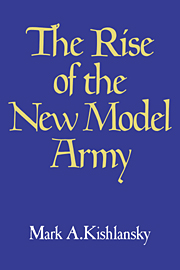4 - The Assault on Parliamentary Politics
Published online by Cambridge University Press: 17 September 2009
Summary
And indeed, many wise and good men are of this opinion to wish the King here; that thereby men might be taken off from pursuing their several interests and from seeking to devour each other and to mind the common good.
The year 1646 was a time for decisions. In years crowded with unprecedented events since the beginning of “these unnatural wars,” 1646 promised to be denser still. Preparations for another campaign proceeded smoothly in contrast to the disarray of the King's forces. The noose of New Model regiments around Oxford was being drawn tighter and few believed the war would last much longer. With its military victory, Parliament's vacillating course between war and peace was over – peace alone remained to be settled. Since the previous September the two Houses had been studying proposals for a final accommodation. The issues to be resolved were those that had initiated the fighting: religion, control of the militia, and the Protestant ascendancy in Ireland. The King's duplicitous conduct at Uxbridge, no less than Parliament's decisive military triumph, eliminated the possibility of negotiated settlement. The terms that were set by the Houses were to be presented as bills to be signed into law.
Although negotiations would not take place between King and Parliament, the men at Westminster would not settle the future course of government alone. The war had developed a momentum and a logic of its own.
- Type
- Chapter
- Information
- The Rise of the New Model Army , pp. 76 - 102Publisher: Cambridge University PressPrint publication year: 1980



